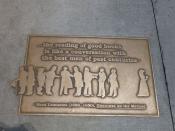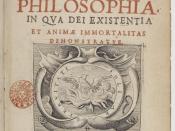"Give a detailed account of Descartes' systematic doubt or methodical doubt in Meditation 1, making it certain that you distinguish between real doubts and so called hypothetical/metaphysical doubts. Then, explain in detail, exactly how Descartes dispels each and every one of these doubts during the course of the subsequent Meditations ÃÂ beginning with the cogito. Do you think that Descartes has been completely successful? Explain."The main goal of Descartes in Meditations on First Philosophy was to find truth behind all of his beliefs in order to build a solid foundation of certainty, and to focus his beliefs strictly on his idea of certainty; essentially to question knowledge. Descartes beliefs are mainly based on the theory that, if someone thinks that they really know something, they must be correct. Descartes meditations bring about 3 key issues that are discussed throughout the entire book; the existence of him being a thinking thing, God as a supreme being and being deceived by the Evil Genius, as well as the idea that the body is an extension of the mind.
Descartes provides a solid argument throughout the entire book, calling into question every aspect of what ÃÂIÃÂ is, and the world around him. Descartes is trying to decipher whether or not he, anybody or anything in fact is real and he also goes on to argue that our knowledge is gained via our everyday experiences. Through examining each meditation, discussing the cogito, as well as what he discusses in terms of his senses and the external world, the dream hypothesis and his evil genius theory; I will conclude that in fact he does exist, knowledge exists, and God exists.
There are two real doubts in which Descartes talks about throughout the meditations. The first being the senses and external world in which he believes...


